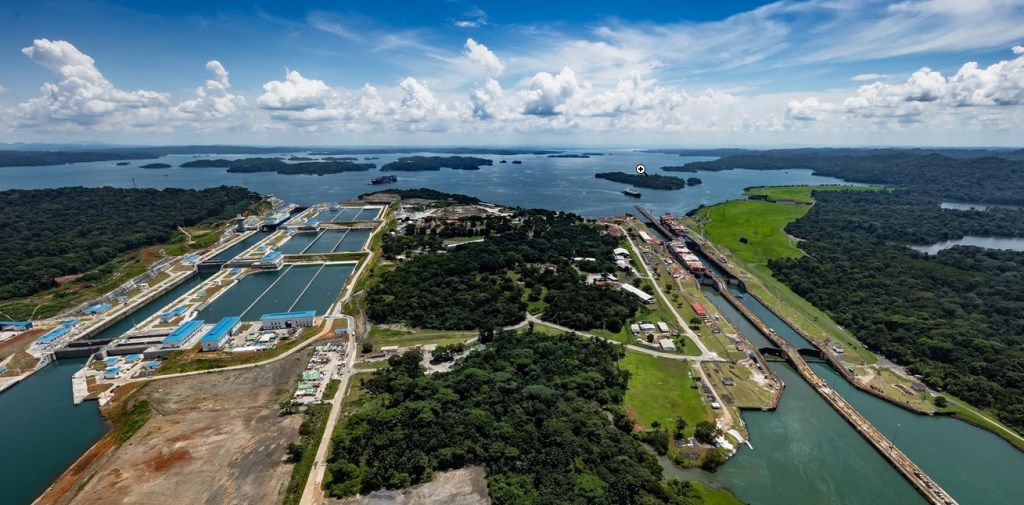Earlier this month, the Panama Canal hosted international experts at an event to discuss ways the global maritime community can adopt more sustainable practices to deliver on their commitments to reducing carbon emissions.
During “The Green Connection and the New Challenges of the Maritime Industry” event, the Panama Canal welcomed international experts including Dr. Alkut Olcer, World Maritime University Professor, and Dr. Jose Matheickal from the International Maritime Organization (IMO)’s Marine Environment Division – in Panama for the Canal-sponsored Latin America Maritime Technology Cooperation Centre inauguration. Canal executives including Deputy Administrator Manuel Benítez; Executive Vice President of Environment, Water and Energy Carlos Vargas; and Environmental Protection Specialist Alexis Rodriguez discussed not only the obstacles facing shippers and maritime officials as they seek to reduce their carbon footprint, but also the opportunities available to them as a result of the Canal’s shorter route and “Green Connection” initiatives.
Reducing Emissions
“When shippers choose the Panama Canal over the Suez Canal to travel from Asia to the U.S. West Coast, they release an estimated 12 percent fewer emissions, and reduce emissions by 18 percent when choosing the Canal over the Cape of Good Hope route.” – Alexis Rodriguez
“Our customers know that, as long as they prefer the Panama Canal route to transit their cargo, they will avoid lengthy distances, save time, consume less fuel and therefore emit less greenhouse gases (GHG) or carbon dioxide (CO2),” said Mr. Vargas.
Over the last 103 years, the Canal has directly contributed to the reduction of an estimated 700 million tons of CO2. Thanks to the shorter traveling distance and larger cargo carrying capacity offered by the Expanded Canal, the new waterway is expected to reduce an estimated 160 million tons of CO2 emissions in the next decade alone.
The Green Connection
Beyond offering a shorter, greener route, the Canal is actively taking steps to manage its own resources responsibly – using innovative water-savings basins, sustainable watershed management programs, and planning to become a carbon neutral entity – as well as encourage others to adopt more environmentally friendly practices.
“Our environmental responsibility begins with us. But we are also committed to helping the rest of the maritime community understand that, if we do not take action, climate change will impact us. We are equally committed to offering them the tools and incentives to take that action themselves,” Mr. Benítez told the crowd. “It’s for this reason we launched the Green Connection initiative, giving incentive to ships that burn fuel efficiently or burn fuel with a low sulfur content, which emit less CO2.”
In July 2016, the Panama Canal launched the Green Connection Environmental Recognition Program, honoring customers exceeding sustainability standards set forth by the IMO. The Program is one of the ways in which the Canal reaffirms its commitment to sustainability both at home and within the industry, providing customers tools and incentives, such as the Green Connection Award and the Emissions Calculator, to lessen their environmental impact.
This April, the IMO’s Marine Environment Protection Committee (MEPC) will meet in London to announce the new Initial GHG strategy focused on ensuring the maritime industry contributes to global efforts to reduce GHG and CO2 emissions. Leading by example and through its work alongside customers, the Panama Canal is taking the necessary steps to address these industry challenges head on.
“The Emissions Calculator helps us gather information so that customers can compare the emissions they save by choosing the Canal over other routes. Further improvements will allow us to segment the information, not only from the point of view of a general client but also by route, vessel and segment types. This will allow us to provide our customers with even more valuable information.” – Alexis Rodriguez
Moving forward, each issue of the Canal connection will feature a link where you can find the month’s CO2 Emission Reduction Ranking, compiled with data from the Emissions Calculator, depicting customers’ efforts and commitment to reducing environmental impact.
